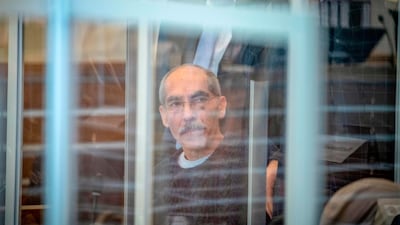Last weekend, two separate trials started in Germany, aiming to bring perpetrators of crimes against humanity in Syria and Iraq a step closer to justice. On Thursday, Anwar Raslan and Eyab Al Gharib, former Syrian intelligence officers, faced German judges in Koblenz, more than 3,000 kilometres from their homeland. They are accused of killing and torturing fellow Syrians.
The hearing shed light on the plight of millions of people who have suffered, and are still suffering, at the hands of the regime. Yet, this prosecution is only one drop in an ocean of unpunished crimes in Syria. As the regime in Damascus clutches onto power, and the war enters a new phase, the probability of those responsible for so much devastation ever being held to account for their crimes at home is near to none.
The day after Raslan and Al Gharib’s trial, another German court, this time in Frankfurt, tried Taha Al Jumailly, an Iraqi man charged with genocide and murder. Al Jumailly and his German wife Jennifer Weinish, both ISIS members, stand accused of enslaving a mother and her child – both members of the minority Yazidi faith – in Fallujah. Both victims were allegedly tortured by Al Jumailly and Weinish, and the five-year-old child eventually died.
Friday’s court hearing is a clear warning to everyone around the world who commits unthinkable, violent crimes that are never truly safe from justice. The outcome of the hearing cannot undo the terrible tragedy that befell the Yazidis and other victims of ISIS. Untold numbers have been murdered by ISIS and even more have been displaced to camps. However, having a sense of justice for even one of these crimes is an important step forward.
These cases could never have been tried in Syria and Iraq. While each country has its own problems, both states have a weakened judiciary that cannot fulfill its duty to serve justice.
The Koblenz trials, in which neither the victims nor the perpetrators were German, are made possible thanks to the Germany’s adoption of the principle of universal jurisdiction. This empowers a country’s judiciary to prosecute certain egregious crimes regardless of where in the world they were carried out and even if they did not involve that country’s citizens. In a justice landscape where victims have little recourse in their home countries and international tribunals are often lengthy and complex, universal jurisdiction can be a valuable tool – provided that the judicial systems applying it are diligent and capable.
In Frankfurt as in Koblenz, victory is bittersweet. It is a form of justice, but it will neither bring back their loved ones nor provide any acknowledgement in their homelands for their suffering. The end goal for the international community must always be to strengthen the rule of law everywhere and to ensure that criminals are immune nowhere. But we are still a long way from there. And for now, it inspires confidence to know that, as the cruelty of war disperses Syrians and Iraqis around the world, there are corners of the earth where they can still seek justice.


